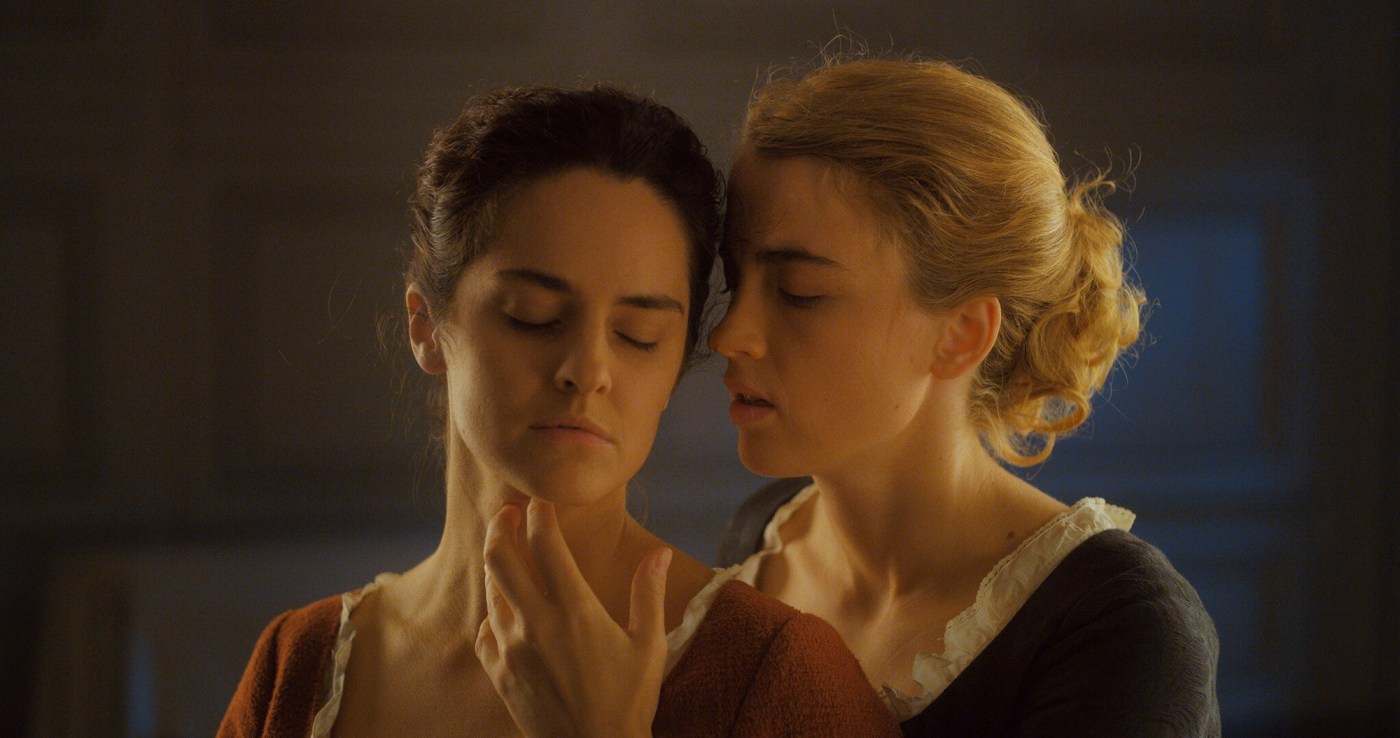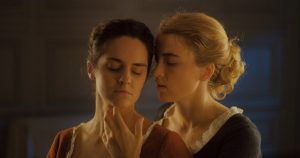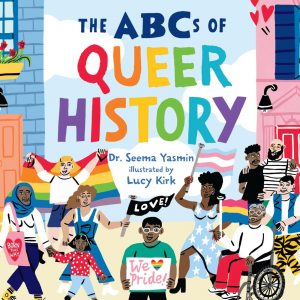
16 LGBTQ+ love stories to stream during Pride Month and beyond
Moira Macdonald | The Seattle Times (TNS)
It’s still Pride Month, so here’s a roundup of some of my favorite LGBTQ+-themed movies, from the many that I’ve reviewed in the past 20 years or so. But don’t think of them just as Pride watching; all of these titles — each of them, at their hearts, about love — make for great viewing, any time.
“Beginners” (2011, rated R). The late Christopher Plummer won his only Oscar for this wise, wistful comedy about a man who comes out as gay just a few years before his death, and about his son (Ewan McGregor) coming to terms with his father’s loss. Its gentle message is that we’re all beginners at love — and all we can do is believe in it. (Streaming on Prime Video)
“Blue Is the Warmest Color” (2013, rated NC-17). Yes, it’s long (watch it when you have three hours), but this French film about a young woman named Adèle (Adèle Exarchopoulos) embarking on her first romance is both sensual — the women’s bodies are lit like sculptures — and moving. Adèle has a way of gazing at the world as if it’s full of possibility; she’s not yet a fully formed person, but an intriguing beginning. (AMC+)
“Brokeback Mountain” (2005, rated R). Ang Lee’s film, based on Annie Proulx’s short novel, broke all of our hearts back in 2005, with Heath Ledger and Jake Gyllenhaal as a pair of cowboys in 1960s Wyoming who know that their love is forbidden. Its central image couldn’t be more prosaic — two worn-soft Western shirts, hanging together — but its impact is huge; this movie stays with you after you’ve seen it, like a haunting love song. (Peacock)
“Call Me By Your Name” (2017, rated R). Quick, name a movie as gorgeously swoony as this one. I’ll wait. Directed by Luca Guadagnino and masterfully adapted by the great James Ivory from André Aciman’s novel, this coming-of-age story is set in an exquisite villa in 1980s Italy, with Timothée Chalamet as a young man dazzled by new feelings of love and longing. (Prime Video)
“Carol” (2015, rated R). I stand corrected: Todd Haynes’ glorious period drama is as swoony as movies get; this 1950s-set movie looks like a Hopper painting come to life. Cate Blanchett and Rooney Mara play forbidden lovers who find themselves falling deeply in love in a story that’s sad, poignant and the tiniest bit hopeful. But “Carol” is less about story than mood — and that mood is perfection. (Netflix, Hulu)
Related Articles
5 books to read in celebration of Pride Month
New documentary ‘Outrage’ covers the early days of AIDS and the story of Danny Sotomayor
Young gay Latinos see rising share of new HIV cases, leading to call for targeted funding
Biden pardons potentially thousands of ex-service members convicted under now-repealed gay sex ban
Hagerty: LGBTQ Dems hail inclusion – except if you’re GOP
“Disobedience” (2018, rated R). A passionate, unexpected love triangle, this vivid drama is set in a conservative Orthodox community in London, to which Ronit (Rachel Weisz) returns home after years away — to find that the woman she once loved (Rachel McAdams) is now married to a man (Alessandra Nivola). Weisz and McAdams find an electric connection, but this film has a generosity of spirit toward all three of its central characters; you leave it believing that their stories continue, somewhere. (Prime Video)
“A Fantastic Woman” (2017, rated R). Winner of the 2018 Academy Award for best foreign language film, this Chilean drama is an eloquent tale of love, heartbreak and hope. Marina (Daniela Vega), a trans woman, struggles to cope with life after the loss of her beloved Orlando (Francisco Reyes), a kind man who was a safe haven for Marina in an often unwelcoming world. Filled with unexpected beauty, the film becomes a quiet triumph over adversity, and an object lesson in adjusting to life’s empty spaces. (Peacock)
“Grandma” (2015, rated R). Lily Tomlin brings light and laughter to every film she’s in, but I especially loved her in this 2015 road comedy. She plays Elle, a gruff, misanthropic grandmother who doesn’t want to admit that she’s in mourning for her longtime partner, who died 18 months previously; instead, she channels that love into helping her granddaughter (Julia Garner). It’s a short, tart film — and an unexpectedly sweet one. (Prime Video)
“The Half of It” (2020, rated PG-13). Alice Wu’s charmer of a rom-com dropped on Netflix just at the beginning of the pandemic, and I suspect it made a lot of us happier. In a high school spin on “Cyrano de Bergerac,” teen Ellie (Leah Lewis) is in love with popular Aster (Alexxis Lemire), a situation complicated by the fact that amiable jock Paul (Daniel Diemer) has hired Ellie to write love letters to Aster on his behalf. It’s a story that worked more than a century ago, when “Cyrano” was new, and it works now; “The Half of It” is funny, poignant, and ultimately a joy. (Netflix)
“The Kids Are All Right” (2010, rated R). Annette Bening and Julianne Moore play a longtime lesbian couple in Lisa Cholodenko’s delightful comedy/drama about a family, in which a teen daughter (Mia Wasikowska) suddenly decides she wants to contact, for the first time, her biological father/sperm donor (Mark Ruffalo). Disruption in the family ensues, but you never doubt that all will be well; these actors are all so very good at creating an atmosphere of love. (Prime Video)
“Love Is Strange” (2014, rated R). A pair of New Yorkers, Ben (John Lithgow) and George (Alfred Molina), are finally able to marry after being together 39 years — but quickly find that, for real estate reasons, they will have to live apart. Ira Sachs’ film shows us, artfully, what years of love look like, and Lithgow and Molina barely need words to convey their characters’ bond; you sense that neither of these men is complete without the other. A lovely, touching film. (Peacock)
“Moonlight” (2016, rated R). Barry Jenkins’ beautifully poetic film about a gay Black man’s coming of age won the Academy Award for best picture in 2017; it’s less a standard narrative than a collection of moments and impressions, unfolding in three acts over two decades, that leaves its central character and its viewers moved and changed. Watching it (and listening to Nicholas Britell’s mesmerizing score) feels like spending time inside someone else’s dreams, and waking up understanding better who they are. (Max, Hulu)
“Pariah” (2011, rated R). Dee Rees’ accomplished debut film is the story of a 17-year-old Brooklyn girl named Alike (Adepero Oduye) who knows that she’s gay, but doesn’t know how to tell her family. It’s not an easy journey, and doesn’t have a textbook happy ending, but the film’s emotional impact is remarkable as you suddenly realize that this sad-eyed young woman has become a quiet tower of strength before our eyes. (Prime Video)
“Portrait of a Lady on Fire” (2019, rated R). This one, from French filmmaker Céline Sciamma, is another gorgeous swooner; not much happens, but everything happens. Two women meet, on an island in 1770 Brittany: an artist, Marianne (Noémie Merlant), is hired to paint a portrait of Héloïse (Adèle Haenel); they gaze at each other for a long time, then fall in love. “Do all lovers,” wonders Héloïse in a passionate moment, “feel as though they’re inventing something?” It’s a beautiful, bittersweet celebration of passion and art. (Hulu)
Taylor Zakhar Perez, left, and Nicholas Galitzine in “Red, White & Royal Blue.” (Jonathan Prime/Prime Video/TNS)
“Red, White & Royal Blue” (2023, rated R). Casey McQuiston’s 2019 novel, in which two of the most famous young men in the world (the king of England’s grandson and the president of the United States’ son) meet and fall in love, is happily ever after all the way. This is frothy rom-com pleasure, right down to the enormous wedding cake that topples on our heroes, because of course it does. (Prime Video)
“A Single Man” (2009, rated R). Tom Ford’s lovely, tragic drama, based on Christopher Isherwood’s novel, has a devastating premise: It takes place over one day in the life of George (Colin Firth), a middle-aged professor in 1962 whose partner Jim (Matthew Goode) has recently died. Jim’s family didn’t invite George to the funeral, and he can’t publicly mourn. It’s an unremarkable day, but Firth uncannily shows us the carefully controlled grief that George can’t bring to the surface. He goes quietly through the motions of his life, as if he’s fading away. (Netflix)
©2024 The Seattle Times. Visit seattletimes.com. Distributed by Tribune Content Agency, LLC.


